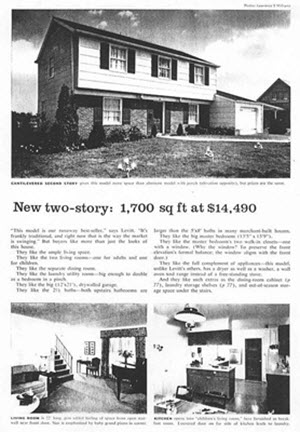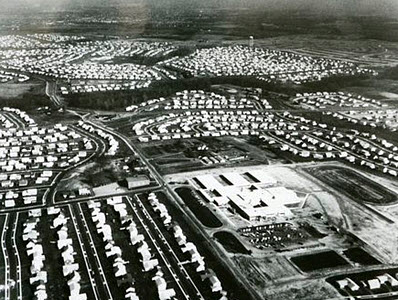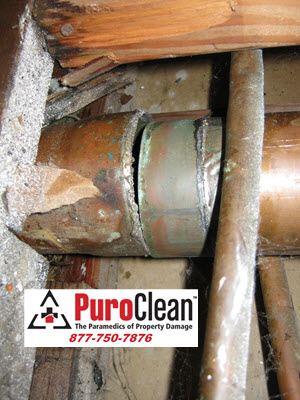Have you experienced water damage in your Willingboro, NJ home? You’re not alone! Many families have recently been affected by the problem.
And you may be scratching your head wondering “Why?”


The beginning of the Willingboro water damage woes started with their construction in the 1950’s.
Levitt & Sons built standardized houses on concrete slabs using pre-cut components. At the height of production, subcontractors moved from house to house, performing their single task with such great efficiency that a Levittown house was completed every 16 minutes.
Following the success of Frank Lloyd Wright’s Usonian homes built with hydronic radiant floors, Levitt & Sons buried copper pipes in the concrete slabs of every Levittown home, including most of the homes in Willingboro. In these systems, heated water is pumped from a boiler through tubing laid in a pattern under the floor.
A hydronic radiant heating system has several advantages:
- First, once it’s up and running, a radiant system can be up to 30 percent more efficient than baseboard or forced-air heating because no energy escapes as it goes through the ducts.
- Second, there’s no comparison when it comes to comfort. Walking on one of these floors in the dead of winter is like a taste of heaven.
- Third, it can use different energy sources for the boilers like solar, gas, oil or wood.
- And fourth, hydronic radiant floor heating systems are beneficial to people with allergies because they don’t blow air around containing dust, molds or pollen.
So, for all these reasons, constructing Willingboro homes with this type of radiant heat seemed to be a good choice at the time.
The problem is that after over 50 years of use, the original piping installed by the builders has corroded. And once corroded, the pipes have a greater chance of bursting.

What that means is that Willingboro water damage is now a common occurrence.
So how do you know if water damage to your Willingboro home is coming from your heating system?
-
-
- In some homes, the water damage is immediately apparent. Flooded kitchens and soaked bedroom carpets tell the story of the broken pipes.
-
- In other homes, a slow leak causes mold growth when water from the floor wicks up the drywall. In that case, the first indication the heating system is leaking is a musty odor, or
-
increased asthma symptoms in the mold sensitized individual.
-
- For other homeowners, the only indication that their heating system has failed are cold spots on the floor, or the sound of a boiler or water running constantly.
-
- In still others, a mushy wet spot on the lawn, even in dry weather, indicates a pipe has been leaking underneath the slab.
-
- But for still others, the burst pipes in the heating system only become apparent when the water bill comes in at the end of the month and the charge for water use has skyrocketed.
What to do about Willingboro water damage:
If you notice any of the occurrences in your Willingboro home your first step is to stem the tide of the damage. To do that, you will need to turn the water off at the main.
In most Willingboro homes, the shutoff valve is located under the kitchen sink.
Next, you want to minimize the loss by remediating the water damage fast. That means getting your property clean, dry and sanitized quickly.
Remember: concrete takes special meters to measure the moisture to assure it’s dry.
Trust our staff to provide you with the restoration services you need to salvage and restore your home or business in Willingboro.
But most importantly, Call us immediately if you suffer from water damage in your Willingboro home, whether it’s from storm damage, a burst pipe, leaking radiant heat system, or a toilet overflow. We’re here for you at 877-750-7876
